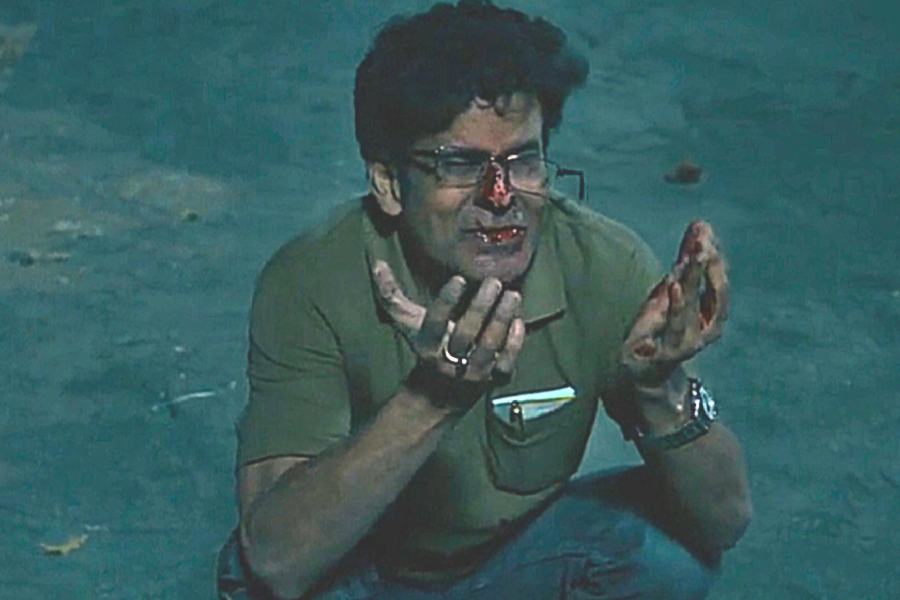After earning widespread acclaim for his first two feature films, Titli (2014) and Agra (2023), director Kanu Behl offers an unvarnished look at the twilight of print journalism in his third feature film Despatch. This is shown through the life of Joy (Manoj Bajpayee), a beleaguered middle-aged journalist grasping for relevance in a world rapidly pivoting to digital platforms.
Streaming on ZEE 5, Despatch is less of a taut investigative thriller and more a contemplative dissection of personal and professional disintegration. While it is thematically ambitious and anchored by Bajpayee’s transformative performance, Despatch is ultimately weighed down by its structural lethargy and narrative ambiguity.
Despatch revolves around Joy’s obsessive pursuit of a story that he hopes will be his redemption — a multi-layered scam involving corporate fraud, corrupt politicians, and criminal syndicates. Yet, this is no conventional journalistic exposé filled with the rush of uncovering hidden truths. Joy stumbles into the investigation rather than driving it with purpose, and the deeper he delves, the more absurd and surreal his journey becomes.
The narrative begins with Joy at his lowest. His career as a print journalist is on life support, and his personal life fares no better. His wife, Shweta (Shahana Goswami), barely conceals her disdain for him during their rare interactions. In one painfully raw scene, they engage in clumsy, joyless intercourse — a physical manifestation of their emotionally barren marriage. Shweta appears to have resigned herself to a life of bitterness, while Joy’s affair with his junior colleague Varsha (Parvati Sehgal) merely serves as a fleeting distraction that underscores his inability to connect meaningfully with anyone.
Despite his disarray, Joy still clings to his identity as a journalist. When a lead about a financial scam falls into his lap, he sees it as an opportunity to reclaim his relevance. The scam involves JRD, a major conglomerate whose shady dealings include shell companies and money laundering. But Joy’s investigation is far from the slick, fast-paced thrillers we’ve come to expect from stories about journalism. Instead, it is a series of haphazard, almost farcical encounters that expose the absurdity of his quest.
In one particularly amusing sequence, Joy infiltrates a corporate office posing as an auditor, hoping to gather evidence. The operation goes hilariously wrong as he fumbles his way through, dodging security guards with increasingly awkward manoeuvres. The scene encapsulates the film’s tone: a mix of bleak humour and existential dread, where even small victories feel hollow.
As Joy digs deeper, he becomes embroiled in a web of intrigue that forces him to interact with a spectrum of characters, each as morally ambiguous as himself. He collaborates with corrupt cops, trails mobsters into their dens, and narrowly escapes shootouts.
The investigation itself becomes increasingly convoluted. Layers of corporate corruption, political complicity, and media manipulation unfold, which the film intentionally refuses to clarify. Names and connections blur together, making it difficult to discern who orchestrates what. This lack of narrative clarity mirrors Joy’s descent into confusion and despair. The scam ceases to matter; what takes centrestage is Joy’s futile attempt to make sense of it all.
As the film progresses, Joy grows more desperate. He becomes increasingly reckless, alienates the few people who tolerate him, and plunges deeper into a labyrinth of danger. The final act sees him spiralling out of control, his once-dogged determination devolving into self-destruction.
Behl’s treatment of the story is unapologetically bleak. There are no rousing moments of triumph or even cathartic revelations. Instead, the film lingers on Joy’s failures, his unfulfilled relationships, and the banality of his existence. Behl’s storytelling is slow and deliberate, often frustratingly so. Scenes linger past their natural endpoint, conversations meander, and the plot repeatedly doubles back on itself.
Despite its flaws, Despatch is a compelling character study, elevated by Manoj Bajpayee’s extraordinary performance. Bajpayee captures Joy’s desperation with an almost visceral intensity — from his awkward physicality to the haunted look in his eyes. His portrayal anchors the film, lending humanity to a character who might otherwise feel like an abstraction.











